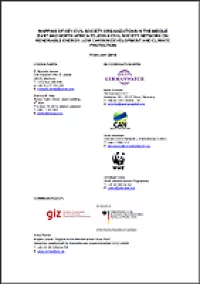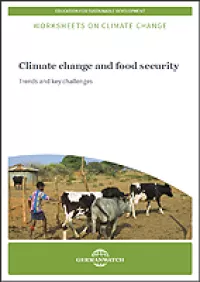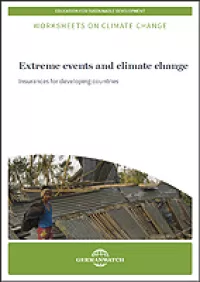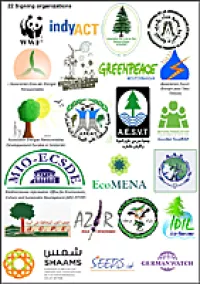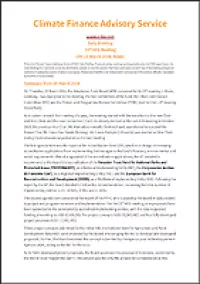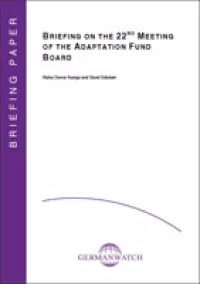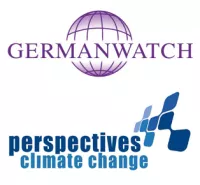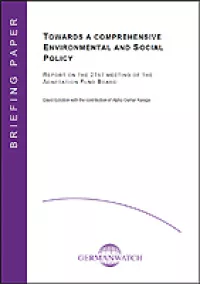Aktuelles zum Thema
Publication
Civil society actors are key agents of a transformation into a post-fossil society. They can influence policy-making and shape the awareness of the general public and specific constituencies, such as consumers, workers and farmers. With the aim to increase civil society involvement in the fields of renewable energy, low carbon development and climate protection in the MENA region, this study provides an overview of around 40 civil society and non-governmental organisations (CSOs/NGOs) from 12 MENA countries which would be interested to increase their political engagement.
Publication
Trends and key challenges
The materials presented here give pupils the opportunity to work through the links between the areas of food security and global climate change. These connections, intensifying as they are in a world of increasing globalisation and constant change, are examined throughout the various regions and in a more detailed way.
Publication
Insurances for developing countries
These teaching materials provide school pupils with the chance to work independently through the thematic complex surrounding climate change and weather-related climatic events.
Publication
for the UfM Ministerial Meeting on Energy, 11th December 2013, Brussels
Civil society organizations dealing with the environment and renewable energy in the MENA region want to cooperate on the protection of the climate and get engaged in the political decision-making processes of promoting renewable energy in the MENA region. Therefore 23 NGOs, particularily from the MENA region, agreed on the attached position paper which will be submitted for the UfM Ministerial Meeting on Energy aiming to adopt the Mediterranean Solar Plan (MSP) in Brussels in December 2013.
Publication
Towards a sustainable urbanisation: Chinadialogue special edition on urbanisation
Beijing, November 18, 2013 | In collaboration with E3G – Third Generation Environmentalism, Germanwatch, the Wuppertal Institute and Stiftung Mercator, chinadialogue produced a special edition of its journal focusing on one of the biggest challenges facing China’s leaders over the next two decades: sustainable urbanisation.
Press Release
Major share of economic and human burden of weather catastrophes on developing countries (press release english)
Overshadowed by the ongoing human catastrophe in the Philippines, Germanwatch presented the 9th annual Global Climate Risk Index at the onset of the Climate Summit in Warsaw. “The index shows that the most severe weather related catastrophes in 2012 occurred in Haiti, Philippines and Pakistan”, says Sönke Kreft, Team Leader International Climate Policy at Germanwatch and co-author of the index. „The landfall of Hurricane Sandy in the US dominated international news in October 2012. Yet, it was Haiti - the poorest country in the Western Hemisphere - that suffered the greatest losses from the same event."
Publication
This is the Climate Finance Advisory Service (CFAS) Daily Briefing. Produced at key meetings and negotiations by the CFAS expert team, the Daily Briefings try to provide a concise, informative update on key discussions that have taken place at each day of the meeting and give an overview of substantive points of action or progress. Please note that this is an independent summary by CFAS and not officially mandated by the AFB or its secretariat.
Publication
The 22nd meeting of the Adaptation Fund Board took place in Bonn from October 31 - November 1, 2013. Please find below the Briefing Paper.
Publication
For many developing countries ensuring food security remains a key development challenge, often aggravated by climate change impacts. However, a number of governments that set-up national climate change strategies with the intention to improve conditions in the agricultural sector often find it difficult to address climate change mitigation, adaptation and food security elements in a synergy-oriented manner. The question arises what kind of institutional set-up would be required to better address this challenge?
Publication
Report on the 21st meeting of the Adaptation Fund Board
The Adaptation Fund (AF) was established under the Kyoto Protocol of the UN Framework Convention on Climate Change (UNFCCC), in order to finance concrete adaptation projects and programmes in developing countries affected by the global climate change. This report summarizes the key decisions taken during the 21st meet-ing (July 3-4, 2013) of the Adaptation Fund Board (AFB).

